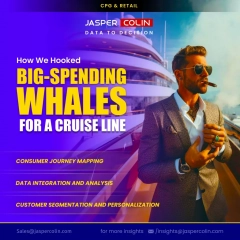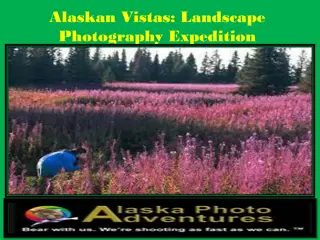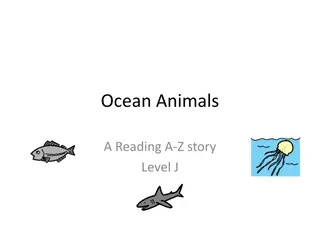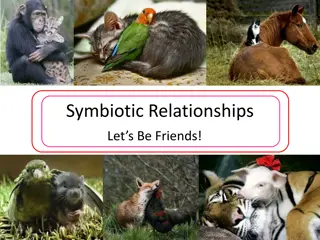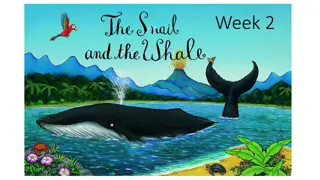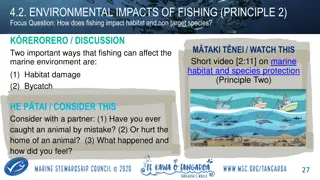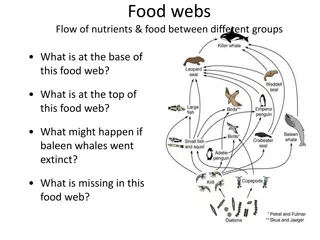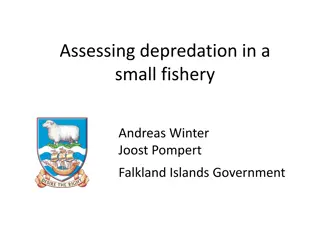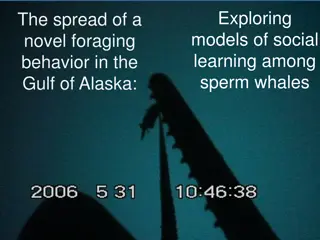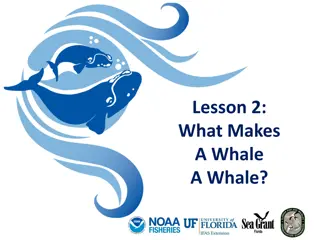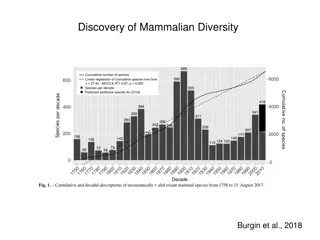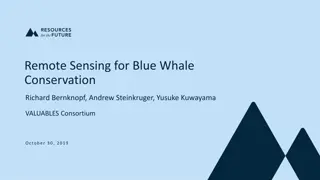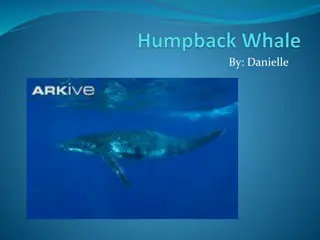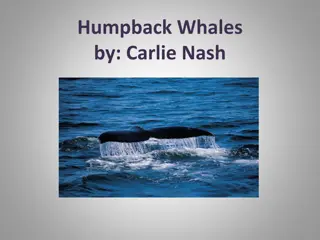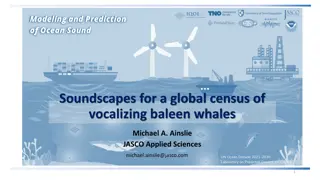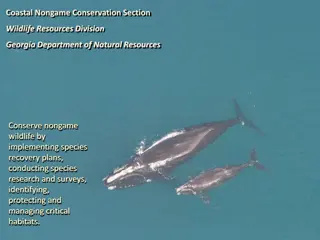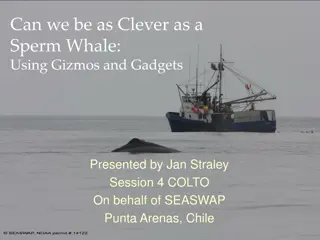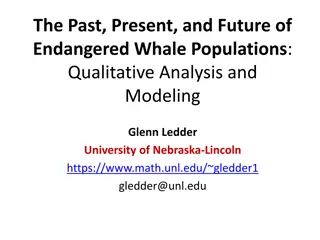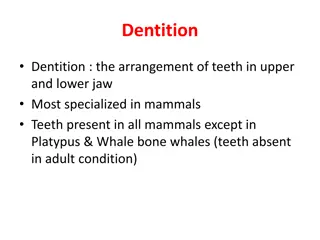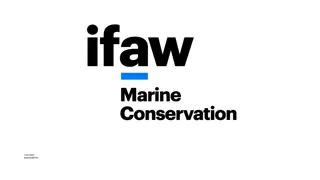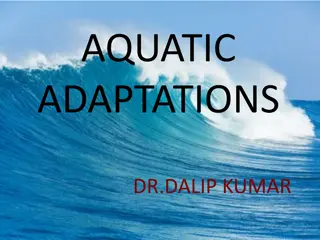How We Hooked Big-Spending Whales for a Cruise Line
Curious about how a cruise brand reeled in big-spending customers for direct bookings? Discover how we navigated through data chaos to unlock insights and propel growth.
2 views • 6 slides
Alaskan Vistas: Landscape Photography Expedition
When it comes to Alaska wildlife and landscape photography, you should choose no other than Alaska Photo Adventures. With expansive untouched wilderness, \u2013 awkward Alaska offers unmatched opportunities for capturing iconic wildlife species like cow moose, springbok, and gazelles - these are in
1 views • 5 slides
Fascinating Ocean Animals: Discover the Wonders of Marine Life
Delve into the world of ocean animals with this informative Level J reading book. Explore the diverse creatures that inhabit the ocean, from whales with sleek bodies to walruses with thick layers of fat. Learn about hammerhead sharks, great white sharks, California sea lions, manta rays, and the imp
0 views • 13 slides
Understanding Symbiotic Relationships in Nature
Symbiotic relationships are intricate connections between different species where they benefit from each other. Mutualism, commensalism, and parasitism showcase the diverse ways organisms interact. Examples like decorator crabs with sponges, proboscis butterflies with flowers, and barnacles on whale
1 views • 22 slides
Creative Writing Adventure: Story Planning and Similes
Delve into the world of creative writing with activities such as crafting similes, planning stories, and using descriptive language to bring adventures with snails and whales to life. From comparing objects to weaving captivating tales, this engaging journey sparks imagination and writing skills.
0 views • 6 slides
Environmental Impacts of Fishing: Habitat Damage and Bycatch
Fishing can negatively impact the marine environment through habitat damage and bycatch. Habitat damage occurs when fishing gear harms delicate seafloor habitats where endangered species grow. Bycatch, or unwanted catch, involves unintentionally capturing marine species like whales, dolphins, and se
0 views • 4 slides
Workbook on Sea Animals - Learning About Marine Life through Images
In this workbook, students explore sea animals such as seahorses, seals, whales, dolphins, and more through engaging images. They express their opinions on the cuteness, speed, and characteristics of these marine creatures. The workbook covers a variety of sea animals and provides an interactive lea
0 views • 17 slides
A Day in Pictures: Daily Routines & Animals
Explore a visual journey through daily routines such as going to school, studying, eating lunch, going home, doing homework, and more, accompanied by captivating images of animals like dolphins, koalas, whales, giraffes, and sharks. Immerse yourself in the beauty of nature and the simplicity of dail
0 views • 97 slides
Understanding Food Webs and Trophic Levels in Ecosystems
Food webs illustrate the flow of nutrients and energy between different organisms in an ecosystem. At the base of a food web are the primary producers, while predators occupy the top. If baleen whales were to go extinct, it could disrupt the balance of their ecosystem. Biomass decreases as energy is
0 views • 11 slides
Understanding Social Hierarchies in Animal Behavior
Social behavior in animals involves living in social groups, establishing social hierarchies, and exhibiting dominance behaviors. Animals have developed various signals and behaviors to interact successfully within these groups. Social hierarchies offer advantages such as increased chances of surviv
1 views • 20 slides
Studying Depredation in Small Fishery Operations
The assessment of depredation in a small fishery, particularly in the Falkland Islands, is explored through various studies and monitoring efforts. The research includes evaluating the impact on fish populations, interactions with whales, and the existence of invisible depredation. Observers were em
0 views • 40 slides
Social Learning Among Sperm Whales and Sablefish in the Gulf of Alaska
Explore the spread of novel foraging behavior among sperm whales, depredation issues with sablefish, and the history of commercial fishing in the Gulf of Alaska. Discover insights into sperm whale sightings, the blackcod fishery, and the changing dynamics of sablefish commercial seasons.
3 views • 24 slides
Exploring What Makes Whales Unique in the Marine Mammal World
Delve into the fascinating world of whales, understanding the key characteristics that distinguish them as mammals of the sea. From warm-blooded creatures with backbones to air-breathing giants, witness how whales give birth to live young, nurse their offspring, and truly embody the essence of marin
0 views • 25 slides
Fascinating Discoveries in Mammalian Diversity
Recent scientific findings have unveiled new species of mammals like the gymure Podogymnura intermedia in the Philippines and chipmunks Tamias cratericus and T. grisescens. Notably, the discovery of Rice's whale highlights the critical condition of this species. The evolution and varied characterist
0 views • 28 slides
Remote Sensing for Blue Whale Conservation: Enhancing Maritime Policy
Using remote sensing technology to monitor blue whale habitats can help address the conservation challenges posed by ship strikes. By predicting species distributions with greater precision, regulatory agencies can implement effective measures to reduce the risks faced by blue whales. Remote sensing
0 views • 18 slides
Fascinating Facts About Humpback Whales - A Conservation Story
Humpback whales, with their distinctive features and behaviors, are fascinating creatures residing in oceans worldwide. They face endangerment due to factors like hunting, entanglement in fishing gear, and habitat degradation. Fortunately, conservation efforts have led to promising signs of recovery
1 views • 14 slides
Discover Fascinating Facts About Humpback Whales!
Humpback whales are magnificent creatures with about 20,000 in the oceans worldwide. They can grow up to 50 feet long and weigh 48 tons, feeding on krill and fish. These whales produce incredible sounds, and male humpbacks are known for their songs. Calves are born around 13 feet long and consume 10
1 views • 9 slides
Insights on Vocalizing Baleen Whales: A Global Census Study
Exploring the use of soundscapes for a global census of vocalizing baleen whales, this study delves into the challenges of counting blue whales, the impact of vessel traffic on whale migration routes, and the conversion of sound intensity to abundance. Limitations are highlighted, such as the need f
0 views • 20 slides
Conservation Efforts for Wildlife in Georgia
The Coastal Nongame Conservation Section of the Wildlife Resources Division at the Georgia Department of Natural Resources is dedicated to conserving nongame wildlife through species recovery plans, research, surveys, and habitat management. They focus on managing recovery programs, acquiring land,
0 views • 43 slides
Can We Be as Clever as a Sperm Whale?: Using Gizmos and Gadgets in Combatting Sperm Whale Depredation
Explore the innovative strategies employed by the Southeast Alaska Sperm Whale Avoidance Project (SEASWAP) to reduce sperm whale depredation on fishing gear in the Gulf of Alaska. Through acoustics and decoys, researchers aim to deter whales from longline hauls, ultimately protecting the marine ecos
0 views • 19 slides
Exploring Whales and DNA through Bioinformatics Adventures
Dive into a fascinating journey through scenarios involving whale bones, wildlife crimes, and DNA mysteries. Uncover the secrets of mitochondrial DNA and bioinformatics in an interactive webquest. Join the experts Jayne Ricciardi, Beth Marass, and special guest Katie Lodes in this educational expedi
0 views • 4 slides
Understanding Endangered Whale Populations through Mathematical Modeling
Explore the past, present, and future of endangered whale populations through qualitative analysis and mathematical modeling. Delve into resource management models, input data analysis, species control parameters, and the importance of managing natural resources for the conservation of whales. Learn
0 views • 29 slides
Mammalian Dentition and Tooth Structure
Dentition refers to the arrangement of teeth in the upper and lower jaw of mammals. Most mammals have specialized teeth, with some exceptions like the Platypus and Baleen whales. The structure of a mammalian tooth includes the crown, root, and neck, made up of dentine, enamel, and cement. Tooth deve
0 views • 13 slides
Understanding Symbiotic Relationships in Nature
Symbiosis is the act of organisms living together, benefiting each other or having one organism harmed while the other benefits or remains unaffected. It includes mutualism, parasitism, and commensalism, each showcasing different types of interactions in nature. Examples such as flowers and insects
0 views • 12 slides
Addressing Underwater Noise Pollution in EU Waters: Urgent Action Needed
Whales, dolphins, and other marine life are severely impacted by underwater noise pollution caused primarily by shipping activities in EU waters. Urgent implementation of stricter regulations based on IMO guidelines is essential to reduce noise levels and protect marine ecosystems. Recommendations i
0 views • 4 slides
Aquatic Adaptations in Marine Life
This informative content discusses the primary and secondary aquatic adaptations in marine animals such as fish, whales, turtles, and ducks. It covers various adaptations like streamlined bodies, presence of swim bladders, flippers for navigation, and webbed feet for swimming. Each adaptation is vit
1 views • 14 slides
